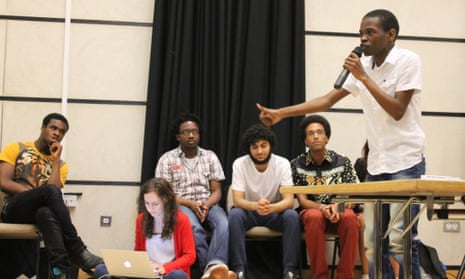Students at Oxford University are campaigning for greater racial sensitivity and representation of non-white culture at the institution. Rhodes Must Fall In Oxford, a campaign set up by students in the city, is calling on the university to “decolonise” the campus and curriculum.
The campaign’s co-founder, Ntokozo Qwabe, a student studying law at Keble College, says: “A lot of the time when people talk about colonialism they think of it as a past event that happened. They don’t think about it as something that manifests itself in everyday life at institutions like Oxford.”
The campaign has gained over 2,500 followers on Facebook and students have protested outside Oriel College, where a statue of Cecil Rhodes stands. It was set-up after students at the University of Cape Town successfully campaigned to remove a statue of Rhodes.
Qwabe argues Oxford honours colonial figures like Rhodes and Christopher Codrington – giving their name to Rhodes House and Codrington library – without criticism. “Rhodes’s legacy is presented in a very uncritical way. It’s a celebration of his triumphs, as opposed to any critical reflection on who this guy was and the consequences of what he did.”
Cecil Rhodes was the British-born mining magnate and founder of De Beers, responsible for introducing enforced racial segregation policies as Prime Minister of Cape Colony in 1890. The Rhodes Scholarship which pays for talented international postgraduate students to study at Oxford, including former US president Bill Clinton, remains Rhodes’s biggest legacy at the university.
The Rhodes Trust says: “While it does not excuse his role in history, Cecil Rhodes’s wealth was left in his will to create educational opportunities that have benefited South Africans of all races, as well as those of many other nationalities. The Rhodes Scholarships have had a remarkably positive effect, educating 8,000 scholars at Oxford, a substantial number of whom are occupied at the forefront of human rights work and are key advocates for expanded social justice.”
Rhodes Must Fall In Oxford is also challenging the curriculum and reading lists, arguing that they are too eurocentric and ignore works by women and people of colour. Qwabe says: “Many marginalised groups have made valuable contributions in various fields, so the explicit exclusion of these groups is in our view symptomatic of a broader problem.”
The students blame the way colonialism is portrayed at the university for attitudes that led to an Oxford Union cocktail called the “colonial comeback” being sold at a debate about the British Empire. Qwabe says: “I was trying to think about how the world would have reacted if it was a Houlocaust comeback or something which is globally uncontested as historical injustice.”
Kiran Benipal, a classics student and co-founder of Rhodes Must Fall In Oxford, says it’s rare a week goes by in Oxford without an incident of racial discrimination or insensitivity. She claims black and minority ethnic students are more likely to be stopped by porters entering their college.
“On one occasion a black friend was late for her tutorial and running through her college – where she had been for three years. She was chased by the porter and after forgetting her student card she was made to sign in to her university email account to prove she was a student. These things are standard,” says Benipal.
Nikhil Ventakesh, BME students officer at Oxford University student union, says: “BME applicants are less likely to receive offers than their white counterparts, and racism is a real problem at Oxford. However, groups such as Rhodes Must Fall and the Campaign for Racial Awareness and Equality (CRAE) show that a lot of students here want to change the university, and I have high hopes that we will.”
A University of Oxford spokesperson says: “It is a top priority for Oxford to identify and address ways in which we can better ensure students feel safe and well represented at Oxford. Senior academics in the humanities and social sciences are working with academics in departments to take forward the curriculum review project with their colleagues.
“Students have given us a detailed and nuanced account of black and minority ethnic student experiences at Oxford. It showed that while BME students generally thrive and do well at Oxford, there are incidents of insensitivity and some students can feel isolated. The university is committed to addressing this and welcomes the fact that its students can raise these issues in a constructive and co-operative atmosphere.”
Keep up with the latest on Guardian Students: follow us on Twitter at @GdnStudents – and become a member to receive exclusive benefits and our weekly newsletter.

Comments (…)
Sign in or create your Guardian account to join the discussion